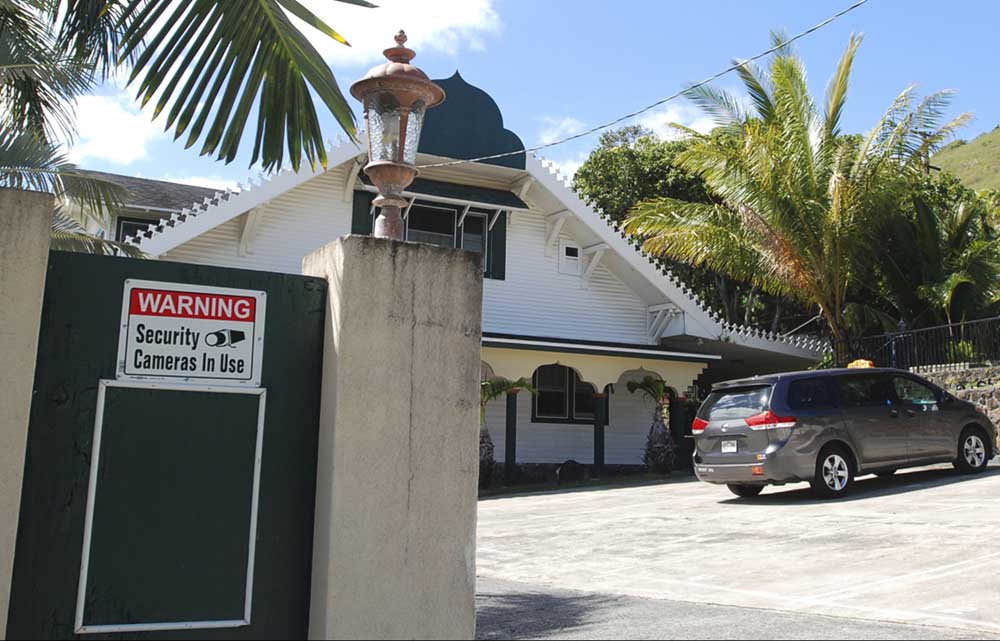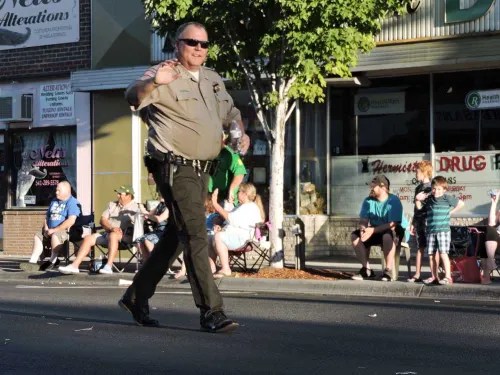World in Brief
Published 4:53 am Thursday, March 9, 2017

- A security camera warning sign is seen at the Muslim Association of Hawaii in Honolulu. The state of Hawaii has become the first state to sue to stop President Donald Trump's revised travel ban. Attorneys for the state filed the lawsuit Wednesday in federal court in Honolulu. The state had previously sued over Trump's initial travel ban, but that lawsuit was put on hold while other cases played out across the country.
WASHINGTON — House Republicans scored a pre-dawn triumph today in their effort to scuttle former President Barack Obama’s health care overhaul, but it masked deeper problems as hospitals, doctors and consumer groups mounted intensifying opposition to the GOP health care drive.
After nearly 18 hours of debate and over two dozen party-line votes, Republicans pushed legislation through the Ways and Means Committee abolishing the tax penalty Obama’s statute imposes on people who don’t purchase insurance and reshaping how millions of Americans buy medical care.
“That’s what this whole bill was about, kicking people who weren’t politically popular,” Ways and Means Chairman Kevin Brady, R-Texas, said of Obama’s overhaul.
It was a victory of high symbolism because Obama’s so-called individual mandate is perhaps the part of the statute that Republicans most detest.
Even so, the White House and Republican leaders confront a GOP and outside groups badly divided over the party’s high-stakes overhaul crusade.
HONOLULU — Hawaii has become the first state to file a lawsuit against President Donald Trump’s revised travel ban, saying the order will harm its Muslim population, tourism and foreign students.
Attorneys for the state filed the lawsuit against the U.S. government Wednesday in federal court in Honolulu. The state had previously sued over Trump’s initial travel ban, but that lawsuit was put on hold while other cases played out across the country.
The revised executive order, which goes into effect March 16, bars new visas for people from six predominantly Muslim countries and temporarily shuts down the U.S. refugee program. It doesn’t apply to travelers who already have visas.
“Hawaii is special in that it has always been non-discriminatory in both its history and constitution,” Attorney General Douglas Chin said. “Twenty percent of the people are foreign-born, 100,000 are non-citizens and 20 percent of the labor force is foreign-born.”
Chin, who noted the state has budgeted about $150,000 for an outside law firm to help with the lawsuit, said people in Hawaii find the idea of a travel ban based on nationality distasteful because they remember when Japanese Americans were sent to internment camps during World War II. Hawaii was the site of one of the camps.
WASHINGTON — The IRS strikes back: The tax agency reports that the number of identity theft victims plummeted last year after agents struggled for years to combat what has become a multibillion-dollar industry.
The number of victims dropped by 46 percent, to 376,000, the IRS said. These taxpayers had their identities stolen by criminals who used their Social Security numbers and birthdates to obtain fraudulent tax refunds.
The IRS stopped nearly 1 million fraudulent refunds from being issued last year. They totaled almost $6.6 billion, the agency said.
“It’s a much more challenging time for the cybercrooks,” said Mark Ciaramitaro, vice president for retail tax products and services at H&R Block. “All of the easy paths have been closed.”
Identity theft exploded from 2010 to 2012, and “for a time overwhelmed law enforcement and the IRS,” said John Dalrymple, deputy IRS commissioner for services and enforcement.
SEATTLE — A judge on Wednesday upheld the $1,000 fines issued by the Washington secretary of state against three electors who broke their vote pledge and cast their vote for someone other than Democrat Hillary Clinton in December.
In the initial order, Administrative Law Judge Robert C. Krabill said the secretary of state is allowed by state law to assess the civil penalties. Under state law, he wrote, the secretary of state may assess a civil penalty up to $1,000 against any elector who votes for a person or persons not nominated by the party of which he or she is an elector.
But Krabill also said he didn’t have the authority to rule on the plaintiffs’ argument that the Constitution doesn’t give the state power to punish electors for contrary votes. He said they could argue it on appeal.
Sumeer Singla, an attorney for plaintiffs Levi Guerra, Esther John and Peter Chiafolo, said Wednesday they were reviewing the order and anticipate appealing it.
Clinton lost four electors in the December Electoral College vote in Olympia — three voted for former Secretary of State Colin Powell and one voted for Native American tribal leader Faith Spotted Eagle.
The fourth voter has also appealed the fine and has a court hearing scheduled for next week, said Peter Lavallee, spokesman for the state attorney general’s office.
The last time an elector broke from the popular vote in the state was in 1976, when Mike Padden of Spokane Valley, who is currently a Republican state senator, voted for Ronald Reagan in 1976 instead of Gerald Ford, who had won the state.
The fine, which has never previously been imposed, was first established by the Legislature following Padden’s vote in 1976.
WASHINGTON — The CIA has gone dark about the WikiLeaks dump of nearly 9,000 pages of purported U.S. intelligence files, even as the anti-secrecy group raised the prospect of providing technology companies additional sensitive details it says it has about the agency’s hacking tools.
The CIA wouldn’t confirm Wednesday that the material came from its files, although no one is doubting they did. The CIA wouldn’t talk about whether there was any investigation underway to figure out how the material ended up on the internet for all to see. And the agency wouldn’t say whether it suspects that a mole lurking inside the CIA secretly spirited the material to WikiLeaks, or whether the CIA could have been the victim of a hack.
Still, without acknowledging any breach, the CIA warned: “The American public should be deeply troubled by any WikiLeaks disclosure designed to damage the intelligence community’s ability to protect America against terrorists and other adversaries. Such disclosures not only jeopardize U.S. personnel and operations, but also equip our adversaries with tools and information to do us harm.”
It was the same message at the White House. “It is our policy as a government not to confirm the authenticity of any kind of disclosure or hack,” said press secretary Sean Spicer.
Outside political circles, the fallout and damage to U.S. intelligence operations was still being assessed, but causing alarm nonetheless.
SAN JOSE PINULA, Guatemala — The trouble started with a mass escape. Dozens of teens held in an overcrowded state-run shelter on the outskirts of Guatemala’s capital flooded through the gates Tuesday evening, most only to be caught and locked down in their dorms.
On Wednesday morning someone set fire to mattresses in the girls’ section of the rural campus, authorities said. The blaze quickly spread through two dorms, killing at least 22 girls and injuring dozens more, most with second- and third-degree burns.
Distraught parents scribbled their children’s names on pieces of paper to pass to shelter staff begging for information. They went to the two local hospitals and the morgue.
Authorities worked to identify victims, but said DNA tests might be necessary for some remains. At Roosevelt Hospital, Dr. Marco Antonio Barrientos asked parents waiting outside for information to come back with photographs, dental records and details about tattoos or other distinctive features.
Piedad Estrada, a street vendor, arrived at the hospital with a photograph of her 16-year-old daughter. She said the teen was pregnant and had been at the shelter for nine days because she ran away from home.
MIAMI — A Miami defense attorney is feeling the heat after his pants caught fire as he delivered closing arguments in an arson case.
Witnesses told the Miami Herald (http://hrld.us/2m4lhIE ) 28-year-old Stephen Gutierrez was fiddling in his pocket Wednesday while addressing jurors when smoke started billowing from his pants. At the time, he was arguing that his client’s car spontaneously combusted and wasn’t intentionally set on fire.
Gutierrez quickly left the courtroom. Jurors also were escorted out.
When Gutierrez returned unharmed, he insisted it wasn’t a staged defense gone wrong. The Herald reports he blamed a faulty e-cigarette battery.
Miami-Dade police and prosecutors are investigating the incident. Investigators seized frayed e-cigarette batteries as evidence.
Miami-Dade Circuit Judge Michael Hanzman could decide to hold Gutierrez in contempt of court.
Gutierrez represented 48-year-old Claudy Charles who was eventually convicted of second-degree arson.
CITE SOLEIL, Haiti — A few dozen Brazilian troops wearing the blue helmets of the U.N. military force stroll through a dense warren of shacks in Haiti’s most notorious slum, facing no greater threat than a few barking dogs along some of the same streets where pitched gunbattles between gangs and peacekeepers used to be a daily occurrence.
Years of easygoing patrols like the one on this recent afternoon in the steamy seaside district of Cite Soleil is a clear sign to many both in Haiti and around the world that it’s time to wrap up a U.N. force that has been cycling through this Caribbean country since a 2004 rebellion engulfed Haiti in violence.
“We have a secure and stable environment,” Col. Luis Antonio Ferreira Marques Ramos, deputy commander of the Brazilian peacekeeper contingent, told The Associated Press. “The important thing is to leave in a good way.”
With a steady downsizing of Haiti peacekeeping operations in recent years and the U.S. administration of President Donald Trump pushing for cutbacks, the U.N. is looking at sending home 2,358 soldiers from 19 contributing countries, perhaps within months. U.N. peacekeeping chief Herve Ladsous said during a recent trip to Haiti that the military component “is likely to disappear in the relatively near future,” though officials have not spoken publicly about the roughly 2,200 foreign police who accompany them.
Washington, the Haiti mission’s main check-writer, is also applying pressure as it reviews all 16 U.N. peacekeeping missions. A diplomat, speaking on condition of anonymity because the conversations were private, has told the AP that the new U.S. ambassador to the United Nations, Nikki Haley, has spoken about winding up the Haiti peacekeeping operation, which is known by its French acronym, MINUSTAH.
CATSKILL, N.Y. — Not only did Thomas Cole paint the lush mountain landscapes that inspired the Hudson River School art movement of the 19th century, he also painted on the walls of his home.
Lost beneath layers of paint for more than a century, the patterned borders below the ceilings were rediscovered several years ago and are now revealed in their semi-faded glory.
The stylized depictions of drapery and fabric, painstakingly recovered by conservators, will be fully displayed when the Thomas Cole National Historic Site opens for the season in May. While not exactly lost masterworks, they offer new insight into one of America’s most influential painters.
“His choice of designs … are his way of expressing his personality, the way he wanted people to see him and the way he wanted people to see his art,” said Elizabeth Jacks, executive director of the site. “It tells us a lot of what was going on in the mind of this person at the time in his life when he was creating these incredible art works.”
Cole is believed to have painted the borders around the time he moved into the house in 1836 to provide a sort of frame for paintings displayed on the parlor walls. One sunny parlor features abstract folds of a fabric in blue and green; the other features a more elaborate pattern depicting drapery swags.





